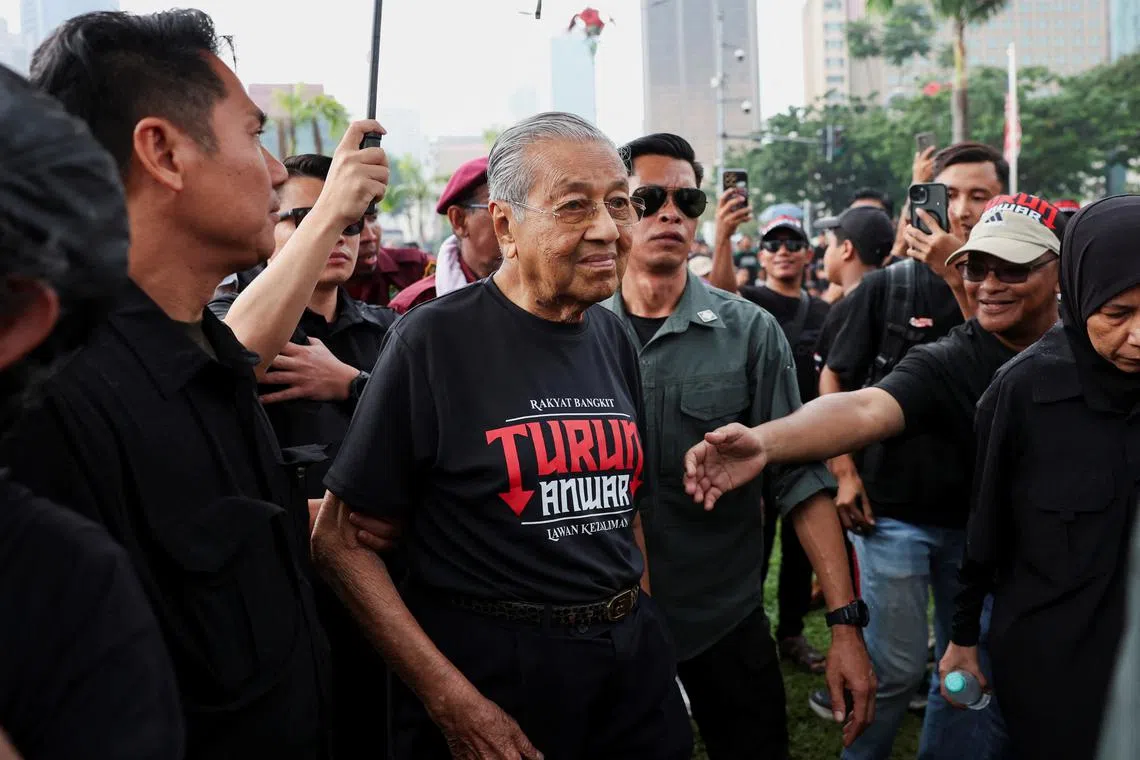Thousands rally in downtown Kuala Lumpur for resignation of PM Anwar
Sign up now: Get insights on the biggest stories in Malaysia
Follow topic:
- Thousands protested in Kuala Lumpur, calling for Anwar to step down, due to rising costs and perceived lack of reforms, despite positive economic indicators.
- Former prime ministers Mahathir and Muhyiddin criticised Anwar's economic policies, citing tax increases and cost of living pressures affecting Malays.
- Analysts suggest the rally reflects Anwar's struggle to gain support from rural Malays, and serves as the opening salvo for the next general election.
AI generated
KUALA LUMPUR – Thousands of people gathered in Kuala Lumpur on July 26 for the Turun Anwar (Anwar Resign) rally demanding that Prime Minister Anwar Ibrahim step down to take responsibility for a slew of economic and political challenges.
“Undur! Undur! Undur Anwar! (Step down! Step down! Step down, Anwar!)” shouted the sea of protesters – mostly donning black – who had congregated at Masjid Negara, the National Mosque.
“Bangkit! Bangkit! Bangkit rakyat! (Rise! Rise! Rise up, people!)” some of them also chanted, as the group marched in drizzling rain towards Dataran Merdeka, or Independence Square, a historic site for Independence Day celebrations and the final gathering place for the rally.
There they were joined by crowds that had marched from other starting points at Masjid Jamek, Sogo Mall and Central Market.
Backed by the main opposition Perikatan Nasional (PN) alliance that had bussed in thousands of people from outside Klang Valley, the rally was also attended by smaller opposition parties and Malay-rights activist groups.
It was the first major rally targeting Datuk Seri Anwar and came amid public frustration over cost-of-living concerns, especially after the sales and services tax was expanded
The organisers said the turnout numbered around 500,000. But the police estimated that about 18,000 people attended the rally.
Despite some positive macroeconomic indicators for Malaysia – inflation was at a four-year low of 1.1 per cent in June, and unemployment at a decade low of 3 per cent – which the Anwar government has touted as achievements, real incomes for many Malaysians have lagged while food and dining costs have soared.
Mr Aiman Zafri, 28, who owns a satay business, turned up at the rally not just to voice his concerns about rising costs, but also to take the opportunity to make some income.
Armed with a trolley of cold drinks for sale, he told The Straits Times that he has found it more difficult to make ends meet compared with five years ago. “I used to be able to sell around 200 to 300 sticks of satay a day. Nowadays, I am lucky if I can sell 100 sticks,” he said.

Mr Aiman Zafri turned up at the Turun Anwar (Anwar Resign) not just to voice his concerns about rising costs, but also to take the opportunity to make some income.
ST PHOTO: AZRIL ANNUAR
“This loss of income has affected my ability to provide for my family. I am making less while the prices of necessities have increased,” the father of one complained.
Mr Anwar rose to power three years ago
However, analysts say his government has little to show, especially in terms of addressing the concerns of the majority Malay community.
On July 26, organisers and the rally crowd, mostly from the Malay community, expressed their concerns – in addition to rising prices of daily goods and the lack of reforms that Mr Anwar had promised, they were also unhappy that corrupt leaders were being let off the hook.
Among those in attendance were former prime ministers Mahathir Mohamad and Muhyiddin Yassin. Tan Sri Muhyiddin is co-leader of PN with Parti Islam SeMalaysia (PAS) president Abdul Hadi Awang, who was absent due to health concerns.

Former Malaysian prime minister Mahathir Mohamad at the Turun Anwar rally in Kuala Lumpur on July 26.
PHOTO: REUTERS
Tun Dr Mahathir, who was the keynote speaker at the event, said Mr Anwar does not understand simple economics.
“He gave everyone RM100 but raised taxes instead. He doesn’t understand how badly the lower-income groups are suffering.
“Even I got RM100. I guess he wants to buy my vote. But he won’t get it,” Dr Mahathir, who turned 100 in July, jested to laughter from the crowd. RM100 is about $30.
Mr Muhyiddin said people have been complaining to him about the price hikes that resulted from the expanded sales and service tax.
“Previously, the list of taxable items was less than 2,000. He added around 4,000 new items, leading to around 6,000 taxable items,” Mr Muhyiddin said, referring to Mr Anwar. “Our protests in Parliament were ignored.”
Mr Anwar, in an effort to douse public dissatisfaction, on July 23 announced a series of measures
The “appreciation package” also sees the postponement of increases in highway toll rates at 10 highways, and Sept 15 added as an additional public holiday ahead of Malaysia Day on Sept 16.
Still, a 25-year-old undergraduate told ST that she decided to attend the rally as she was unhappy with the Premier, especially after the 2024 incident where political cartoonist Fahmi Reza
“What happened to his promise of reform and allowing the freedom of speech? Fahmi used to march and supported him and PKR (Parti Keadilan Rakyat) during the Bersih rallies,” she said, declining to be named for fear of backlash.
Traditionally, Mr Anwar’s supporters are the non-Malays and the Malays living in urban areas.
Despite efforts to woo rural Malays, who make up the majority in Peninsular Malaysia, this group remains firmly in PN’s corner.
Singapore Institute of International Affairs senior fellow Oh Ei Sun said the sizeable turnout, especially from the Malay community, was a reflection of Mr Anwar’s failure to secure the support needed from this particular group.
“A rapidly urbanising Malay population has yet to see Anwar delivering stable jobs, sufficient income and affordable prices to them, and many are attracted to PAS’ alternative sociopolitical narrative,” said Dr Oh.

Organisers and rally-goers hope to raise several issues and grievances that include cost-of-living concerns.
ST PHOTO: AZRIL ANNUAR
According to a recent poll by Merdeka Center, support for Mr Anwar was higher as he crossed the midpoint of his five-year term
Political analyst Adib Zalkapli believes the rally will not have any impact on Mr Anwar’s administration, but it is the opening salvo for the next general election.
“What we are witnessing is just the start of the general election campaign. The government will try as much as possible to be populist, while the opposition will continue to mobilise their supporters until the next general election,” said the managing director of independent geopolitical analyst firm Viewfinder Global Affairs.


